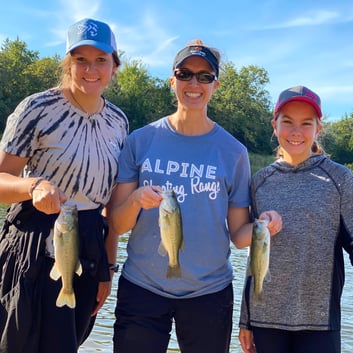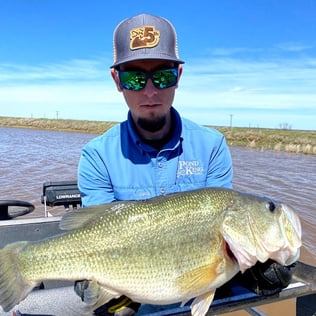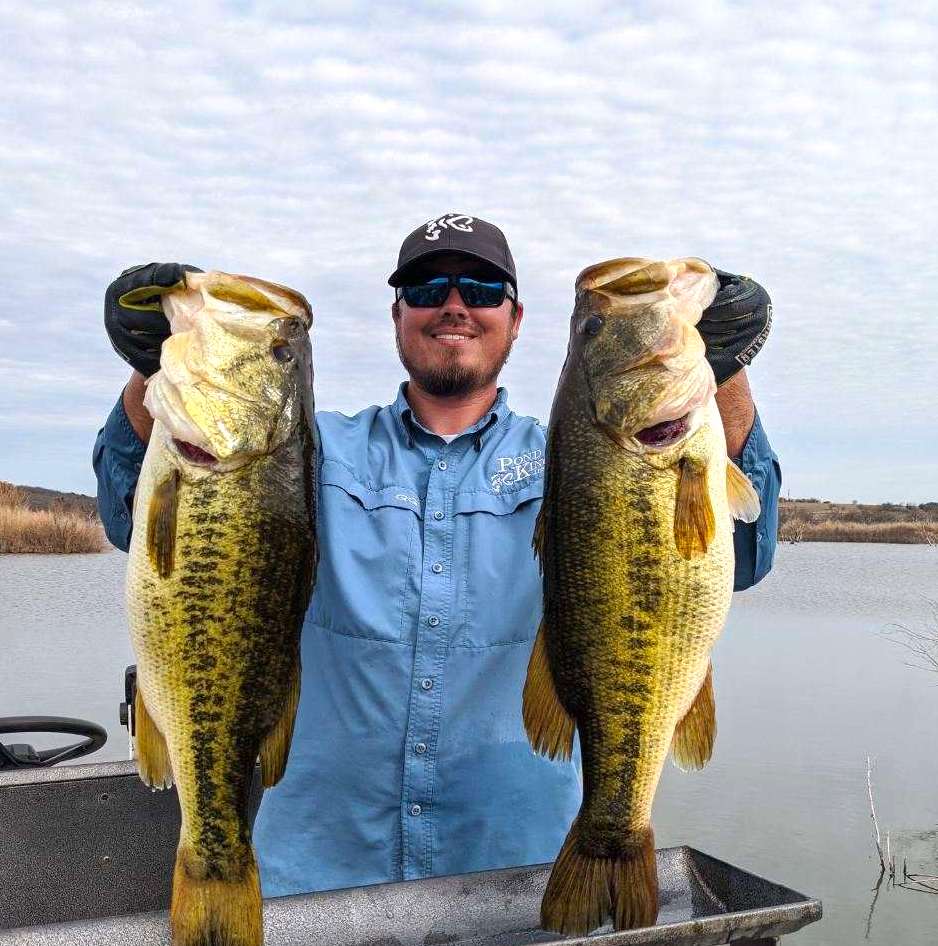At Pond King, our fisheries biologists can almost always develop a pond management plan to help private lake and pond owners reach their goals.
However, it gets a little tricky if your goals aren't appropriate for the size of your pond or lake. Private pond owners should have a concept of the right-sized expectations based on the water body size and profile.
Right-sized Expectations for Your Bass Fishery
In most of our blogs, we use the terms 'pond' and 'lake' interchangeably, but there are significant differences that influence not only your management practices but also the goals you can realistically achieve within these respective bodies of water.
That said, it is nearly impossible to predict with total certainty exactly what size fish a pond can produce, and there can always be exceptions to any rule, but setting realistic goals can help keep budgets and expectations in check.
What is the Difference Between Ponds and Lakes?
For goal setting, we will define ponds as relatively small bodies of water that are shallow enough that sunlight reaches the bottom.
And we will further segregate ponds into two classes:
- bodies of water that are less than an acre
- and those between one and five acres
Finally, we'll define lakes as bodies of water greater than 5 acres and deep enough that there are areas of water that receive no sunlight, preventing plants from growing.
What Type of Fishery Can a Pond Smaller than One-Acre Support

In our experience, serving the Greater North Texas and Southern Oklahoma area, most of the ponds in this size class are backyard ponds or small livestock tanks built to catch runoff.
Generally speaking, these ponds are relatively shallow, which creates a host of water quality issues.
Challenges with Managing Small 1 Acre Ponds
Shallow waters are more susceptible to vegetation issues, dramatic temperature variations, and excess nutrient loading from pasture runoff. These environmental stressors can negatively affect fish behavior and growth.
Hence, it is a good idea to stock species tolerant of such stressors, and that respond well to supplemental feed can do well in these ponds.
Diversify Fish in Small Ponds for Better Results
If your pond is smaller than 1 acre, you'll want to focus on a diversified fishing experience or a bass fishery with a good catch rate.
For a diversified fishing experience, we recommend stocking channel catfish and Bluegill. Both species will grow nicely with a supplemental feeding program and can become relatively large within these small bodies of water.
If you add some Native bass to this mix and maintain a proper forage availability and sufficient water quality, you can have decent production of Bass that are 3 to 5 pounds and hungry enough to strike at your lures with a higher frequency than their fat cousins.
Pros of Ponds Less Than 1-Acre
- Small changes can have a big impact
- Lower investment cost. You won't need as big a pond management budget
Cons of Ponds Less Than 1-Acre
- More likely to have water quality issues.
- The size of fish you'll be able to produce is more limited.
The Right-sized Expectations for One- to Five-Acre Ponds
Bodies of water in this size range are commonly managed as bass fisheries because they can support larger and more diverse forage populations.
In addition, by virtue of their size, these ponds have higher volumes of water, so they are less susceptible to rapid changes in water quality, resulting in reduced environmental stressors to the fish. Because of these factors, with a good management plan, it would be reasonable to expect to produce Bass in the five- to seven-pound weight range.
To achieve this growth, you'll want to consider stocking either the Northern or F1 bass strains.
You'll also need to maintain a good ratio of forage to game fish, so establish a broodstock of Bluegill and offer some alternative forage as necessary to achieve your desired weight goal.
For ponds in this size class, it is reasonable to expect a good catch rate with quality catch weights, but a true lunker would be rare.
Pros of Ponds 1- to 5-Acres
- Less likely to have water quality issues.
- You can expect to raise some decent-sized bass in the 5-7 pound range.
Cons of Ponds 1- to 5-Acres
- You need a fair amount of resources to maintain ponds of this size, especially at the beginning.
- Double-digit Bass will be a pretty uncommon occurrence, but not impossible.
Right-sized Expectations for Lake Larger than Five Acres

If you are looking to raise trophy-class Bass, this is your sweet spot.
Utilizing proper pond management tactics, it would be perfectly reasonable to expect to grow some pretty heft bass in the seven-plus pound range and even achieve the occasional double-digit Bass.
With a body of water this size, consider stocking the F1 Bass strain as they'll be better able to fulfill their growth potential.
Ample Forage is Required to Grow Trophy F1 Strain Bass
To help your F1 Bass reach their genetic potential, be sure to provide a diverse supply of forage.
You'll want Bluegill as your mainstay, but include other species such as Redear, Tilapia, Golden Shiners, and Shad, and even consider adding crawfish in the spring.
Don't forget, you'll need to make sure you have habitat covering nearly 15% of your lake to not only provide ample ambush opportunities for your Bass but also to protect all of your fish from unwanted predation.
You'll also need to implement annual harvests to support optimal growth rates.
Pros of Lakes Larger than 5 Acres
- You can focus on raising true, trophy-class Bass
- You can also create a diverse fishing experience
Cons of Lakes Larger than 5 Acres
- Managing a Bass fishery this size requires a commitment of resources
- You need a pretty big piece of property to support a fishery this big
Are There Exceptions to How a Small Pond Produces? You Bet!
We have described reasonable expectations for different size bodies of water, assuming proper pond management. But there are always exceptions.
For example, even if you practice all the techniques we recommend, mother nature plays a role in the outcomes. Turn-over events, water quality or vegetation issues, unusual predation can all cause setbacks in your progress.
And, in some cases, even if you aren't following all the best practices, you may end up producing a fish beyond expectations by some unusual confluence of genetics and environment. But, typically, these are pretty reasonable expectations for bass fisheries based on the size of the body of water.
Turn to Pond King for Professional Pond and Lake Management
For help reaching your fishery's full potential, you can check out the interactive Pond King Pond Management Planning Guide, call or contact our fisheries biologists. We'll help you figure it out.
See y'all down at the pond.





